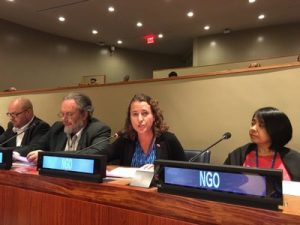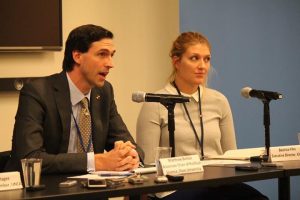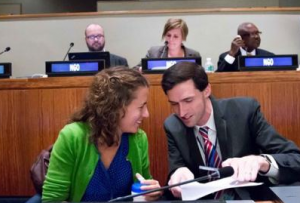Pace University students along with their professors Matthew Bolton, PhD, and Emily Welty, PhD, have been working intensely for three years on negotiations of a nuclear weapons ban treaty with the International Campaign to Abolish Nuclear Weapons (ICAN) that on 6 October was awarded the Nobel Peace Prize for 2017.
ICAN has led the way in recent years in campaigning for an international treaty to make nuclear weapons illegal. The Nobel Prize adds momentum to the Treaty on the Prohibition of Nuclear Weapons adopted at the United Nations by more than 120 countries on July 7 of this year, and should help the process of ratification, with 50 more countries needed. The treaty makes nuclear arms illegal and calls for assistance to victims and remediation of environmental damage.

Emily Welty, director of Peace and Justice Studies at Pace University, delivers a statement at the UN General Assembly First Committee in October 2016. As Vice Moderator of the World Council of Churches Commission of the Churches on International Affairs, she has mobilized faith communities to participate in ICAN’s Nobel Peace Prize-winning advocacy.
Welty is the Vice Moderator of the World Council of Churches Commission on International Affairs which is a member of ICAN and Main Representative to the United Nations for the International Peace Research Association. Her focus has been primarily been on mobilizing communities of faith to speak out on nuclear disarmament.
Bolton was part of a specific ICAN team that advocated successfully for the treaty to include victim assistance and environmental remediation provisions, as well as obligations on states to provide international cooperation and assistance to countries affected by nuclear weapons use and testing.
“ICAN’s Nobel Peace Prize is a vindication of an approach to global peace and security that centers on human rights, humanitarianism and the environment, on the people most affected by violence,” said Bolton. “Nuclear weapons use and testing has had catastrophic humanitarian and environmental consequences. The horrifying record of accidents and close calls show that there are no safe hands for nuclear weapons. ICAN showed the way that – like other weapons of mass destruction and inhumane weapons – nuclear weapons should be banned. The nuclear weapon prohibition treaty is the most significant shift in nuclear politics since the end of the Cold War and it is wonderful that the Nobel Peace Prize recognized the thousands of people around the world who made it happen.” Bolton participated in a press conference a year ago with the ICAN director at the UN Correspondents’ Association.
Terrie Soule and Sydney Tisch are juniors at Pace University majoring in Peace and Justice Studies, housed in Pace’s Dyson College of Arts and Sciences, and just two of about 20 students who have been involved in this disarmament work. They are interns at the World Council of Churches, an ICAN partner in nuclear disarmament. The students made advocacy calls to all of the diplomatic missions who had voted in favor of the treaty at the negotiating conference this summer and urged states to sign and ratify the treaty when it opened for signature on September 20.
In speaking about a previous project, Tim Wright, ICAN’s Asia-Pacific director, applauded Pace’s peace studies initiatives. “Pace is one of a small number of academic institutions – anywhere in the world – that takes disarmament education seriously. Indeed, it is a leader in the field, teaching the theory and practice of disarmament in a way that is both meaningful for students and beneficial to society,” said Wright. “More institutions should follow its example.”

Beatrice Fihn (right), executive director of the 2017 Nobel Peace Prize recipient ICAN, with Director of Pace University’s International Disarmament Institute Matthew Bolton (left) at a press conference at the UN Correspondents Association in October 2016.
Pace is in good company. Other institutions heavily involved in these negotiations include the Harvard Law School International Human Rights Clinic, The Program on Science and Global Security (SGS), based at Princeton University’s Woodrow Wilson School of Public and International Affairs and The James Martin Center for Non-Proliferation Studies at the Monterey Middlebury Institute of International Studies. The treaty’s preamble recognizes the contribution of academics and the “importance of peace and disarmament education.”
“The Pace University community can be proud of their participation in the advocacy that led to the nuclear weapons ban,” said Bolton. “Students gave many hours to this Campaign as interns, volunteers and in civic engagement assignments. Faculty advised the campaign, engaged in advocacy and offered input based on their research.”
Welty and Bolton are a married couple who teach at Pace and made a conscious decision together to devote their lives to promoting peace and disarmament. Their life’s mission was featured in a video this year when they were nominated for a national Jefferson Award.
Pace University was featured in the former UN Secretary General Ban Ki-moon’s report on disarmament and non-proliferation education in August 2016, recognizing Pace’s “growing role in disarmament education”, highlighting the Model UN program, the Peace and Justice Studies major, research by Pace faculty, Disarmament Forums hosted at Pace, and a UN-funded project providing training to East African officials on the Arms Trade Treaty.
Pace University student Rachel Salcedo and Welty contributed recently to multilateral disarmament discussions in addresses to the United Nations General Assembly.

Pace University professors Emily Welty and Matthew Bolton engage in advocacy at the United Nations.
“There has never been a more important moment to think about and work for nuclear disarmament and I hope that this award creates new urgency for all nations to sign and ratify the treaty,” said Emily Welty, PhD, assistant professor and director of Peace and Justice Studies at Pace. “The new treaty banning nuclear weapons honors the voices and experiences of the survivors of the horrific suffering wrought by the United States when we bombed Hiroshima and Nagasaki and all of the victims of nuclear testing. Being a part of ICAN and working for nuclear disarmament on behalf of faith communities has been one of the most important parts of my activism and putting into practice the theory I teach in the classroom.”
“Nuclear disarmament is an important issue to me because I believe that long-lasting peace cannot be achieved through threats to destroy one another,” said Tisch. However, I believe it can be achieved through meaningful dialogue and cooperation, for which a ban on nuclear weapons sets an amazing precedent.”
“The ban on nuclear weapons is so important because it is a huge step towards a more safe and peaceful world,” said Soule.
Welty’s work with the campaign was profiled here. Bolton writes regularly about disarmament and the nuclear weapons ban treaty on his blog. He also wrote a brief guide to the new treaty. They both contributed to a Special Section of the journal Global Policy on the process leading to the ban, telling the ICAN story and the role of faith groups.
About Dyson College of Arts and Sciences: Pace University’s liberal arts college, Dyson College offers more than 50 programs, spanning the arts and humanities, natural sciences, social sciences, and pre-professional programs (including pre-medicine, pre-veterinary, and pre-law). The College offers access to numerous opportunities for internships, cooperative education and other hands-on learning experiences that complement in-class learning in preparing graduates for career and graduate/professional education choices.
About Pace University: Since 1906, Pace has educated thinking professionals by providing high quality education for the professions on a firm base of liberal learning amid the advantages of the New York metropolitan area. A private university, Pace has campuses in Lower Manhattan and Westchester County, N.Y., enrolling nearly 13,000 students in bachelor’s, master’s, and doctoral programs in its Lubin School of Business, Dyson College of Arts and Sciences, College of Health Professions, School of Education, Elisabeth Haub School of Law, and Seidenberg School of Computer Science and Information Systems. www.pace.edu
